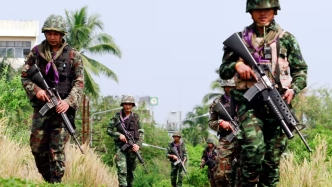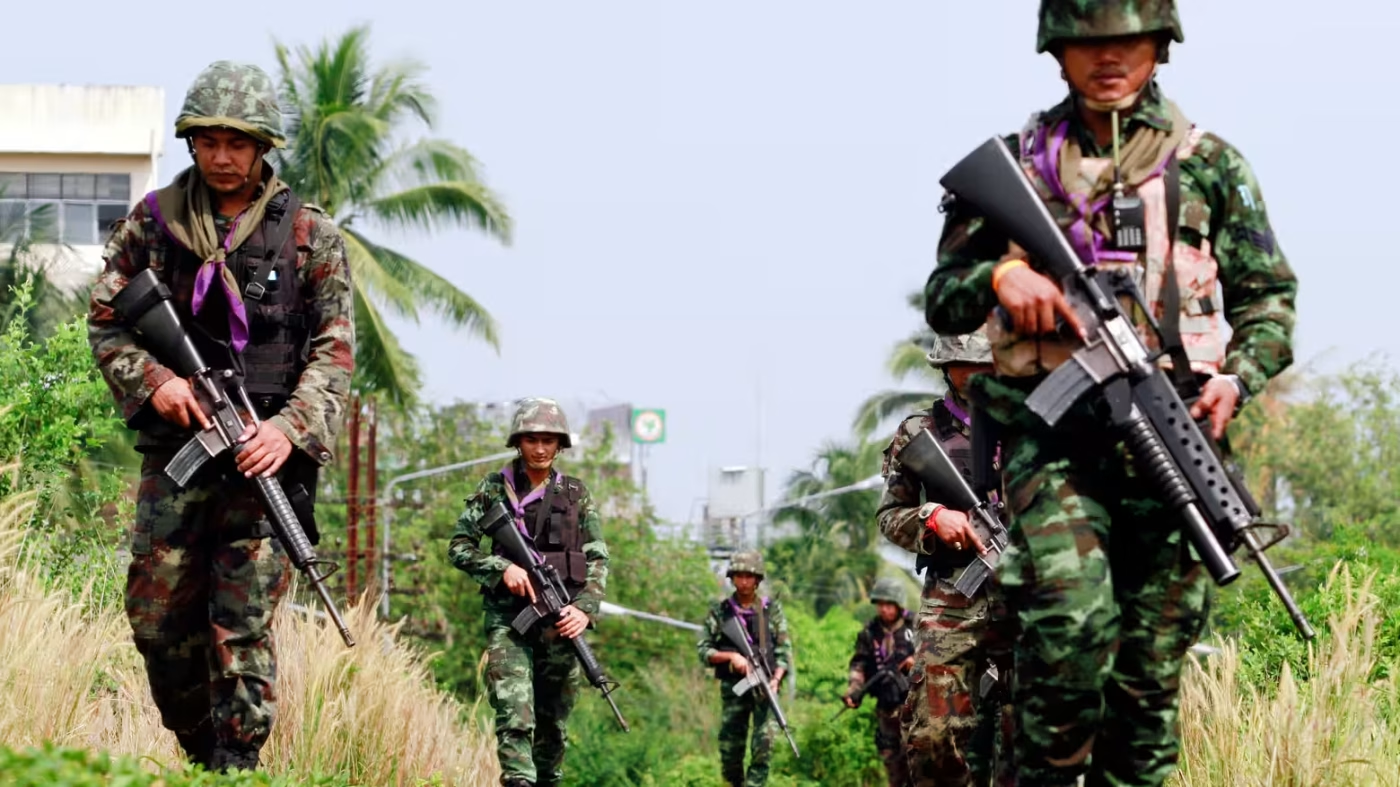By Rohan Lim, SIngapore
Thailand’s southern border provinces of Pattani, Yala, and Narathiwat are grappling with a surge in insurgent violence, as coordinated attacks targeting Thai Buddhists, state officials, and Muslims cooperating with authorities have killed at least four and injured dozens. Attributed to the Barisan Revolusi Nasional (BRN), the assaults—timed with Ramadan and fueled by stalled peace talks—have reignited calls for decisive government action. If driven by political motives, as some analysts suggest, the violence could pressure Bangkok to rethink its southern strategy, but no evidence confirms such intent. As security forces bolster operations, civilians remain caught in a decades-long conflict, testing Thailand’s resolve to forge peace in its restive south.
The attacks, launched in early May 2025, struck vulnerable targets to maximize outrage. In Narathiwat, motorbike gunmen killed two elderly Thai Buddhists, while a bomb near a Ramadan charity event in Yala wounded 15, including children (Thai Examiner, 4 May 2025). The BRN, a Malay-Muslim separatist group, denied targeting civilians (Nation Thailand, 6 May 2025), but security analysts point to seven factors: stalled peace talks under Prime Ministers Srettha Thavisin and Paetongtarn Shinawatra, BRN infighting, Ramadan tensions, reduced checkpoints, security fatigue, debates over special administrative status, and provocative government rhetoric. Prime Minister Paetongtarn has vowed a robust response, deploying additional troops and rejecting the Anti-Terrorism Act to avoid alienating locals (Nation Thailand, 6 May 2025).
“The situation demands urgent dialogue, but peace talks remain stalled,” said Gen Nattapon Nakpanich, Deputy Defense Minister, during a 7 May visit to Yala, where he met religious leaders and security forces. If insurgents aimed to exploit this vacuum, as some suggest, their strategy has drawn condemnation, though their precise motives remain unconfirmed. With over 7,500 deaths since 2004, Thailand’s Deep South conflict—rooted in Malay-Muslim demands for autonomy—continues to defy resolution, leaving civilians as the primary victims.
Drivers of Violence and Government Response
Security analysts attribute the violence to a mix of structural and immediate triggers. Peace talks, mediated by Malaysia, faltered after Deputy Prime Minister Phumtham Wechayachai called for a strategic overhaul in 2024 but failed to appoint a Thai dialogue representative (Bangkok Post, 5 May 2025). Internal BRN splits—between older leaders favoring talks and younger factions pushing violence—have fueled independent attacks (Nation Thailand, 6 May 2025). Ramadan, historically a tense period, saw reduced checkpoints under the “Ramadan Panjor” policy, easing local access but exposing vulnerabilities (Thai Examiner, 4 May 2025). If insurgents exploited these gaps, as authorities suspect, it highlights security lapses, though no direct evidence links the policy to the attacks.
Fatigue among security forces, operating in a high-threat region for two decades, has led to vigilance lapses, per military reports (army.go.th, 6 May 2025). Political debates over special administrative status—a proposed governance model for the south—may have emboldened insurgents, with some analysts suggesting the attacks aim to force concessions. If true, this could reshape negotiations, but such motives are speculative. Government statements, including Paetongtarn’s 3 May call for “swift justice” (@ThaiEnquirer, 3 May 2025), may have provoked retaliatory strikes, though this remains unproven.
The government’s response centers on military and community engagement. Gen Nattapon’s visit, followed by Army Commander-in-Chief Gen Phana Klaewplodthuk, aims to boost morale among the 4th Army Region, led by Lt Gen Paisan Nusang. Nine ranger regiments (144 companies) and six female ranger units (45 squads) operate across seven task forces in Raman (Yala), Panare (Pattani), Nong Chik (Pattani), Sai Buri (Pattani), Ra-ngae (Narathiwat), Rueso (Narathiwat), and Yaha (Yala). Their missions include suppressing violence, adapting to local terrain, and coordinating with agencies like the Internal Security Operations Command (Bangkok Post, 6 May 2025).
Interior Ministry volunteers now man village checkpoints, replacing withdrawn military units, per Gen Phana’s orders (army.go.th, 6 May 2025). Authorities are monitoring “Black Faces” (active insurgents), “Grey Faces” (indirect supporters), and “White Faces” (suspected funders/recruiters with clean records). If “White Faces” are funding the BRN, as claimed, their exposure could disrupt networks, but no public evidence identifies them, and the label risks overreach.
Historical and Cultural Context
Thailand’s Deep South, home to 1.9 million Malay-Muslims (80% of the region’s population), has faced separatist unrest since the 1940s, escalating in 2004 with BRN-led attacks. The conflict pits Malay-Muslim demands for cultural and political autonomy against Bangkok’s centralized governance, complicated by ethnic Thai Buddhist minorities (15%) and historical assimilation policies (ISEAS-Yusof Ishak Institute, 2024). Over 7,500 deaths—60% civilians—highlight the human toll (Bangkok Post, 5 May 2025).
The region’s diversity requires nuanced responses. Attacks on Thai Buddhists and cooperating Muslims aim to sow division, but community leaders, including imam councils, have urged unity (Nation Thailand, 6 May 2025). The “Ramadan Panjor” policy, easing checkpoints to respect Muslim practices, reflects efforts to balance security and cultural sensitivity, though its role in enabling attacks is unconfirmed. If insurgents targeted Ramadan to amplify impact, as analysts suggest, it underscores the need for tailored security during religious periods.
Regional and Political Implications
The violence coincides with domestic political shifts. Paetongtarn’s government, elected in 2024, faces pressure to deliver on campaign promises of southern peace. Her rejection of the Anti-Terrorism Act, citing risks of profiling Muslims, aligns with civil society but limits legal tools (Thai Examiner, 4 May 2025). If special administrative status gains traction, as some MPs advocate, it could address autonomy demands but faces resistance from Bangkok elites (Bangkok Post, 5 May 2025).
Regionally, Malaysia’s mediation role is critical, but BRN’s internal chaos complicates talks. ASEAN’s 2024 security framework urges non-violent resolutions, and Thailand’s response—bolstering troops while engaging communities—sets a precedent for counterinsurgency (ASEAN Secretariat, 2024). If violence escalates, it could strain Thailand-Malaysia border cooperation, though both nations share intelligence (army.go.th, 6 May 2025).
Challenges and Path Forward
Security operations face logistical hurdles. Ranger units, stretched across 1,200 km², struggle with dense jungles and urban pockets (Bangkok Post, 6 May 2025). The 2025 defense budget (THB 198 billion, USD 5.8 billion) prioritizes modernization, but troop fatigue persists. Monitoring “White Faces” risks alienating locals if misapplied, as seen in 2020’s backlash to arbitrary detentions (Human Rights Watch, 2020). If peace talks resume, as Gen Nattapon hinted, appointing a dialogue representative is urgent, but BRN’s disunity complicates trust-building.
Thailand’s democratic resilience—evident in 69% voter turnout in 2024 (Election Commission, 2024)—supports reform calls. Civil society, including the Deep South Watch, advocates community-led peace initiatives, with 60% of locals favoring dialogue over militarization (Deep South Watch, 2025). A balanced approach—security, cultural respect, and talks—could break the cycle, but civilians remain the conflict’s true casualties.















